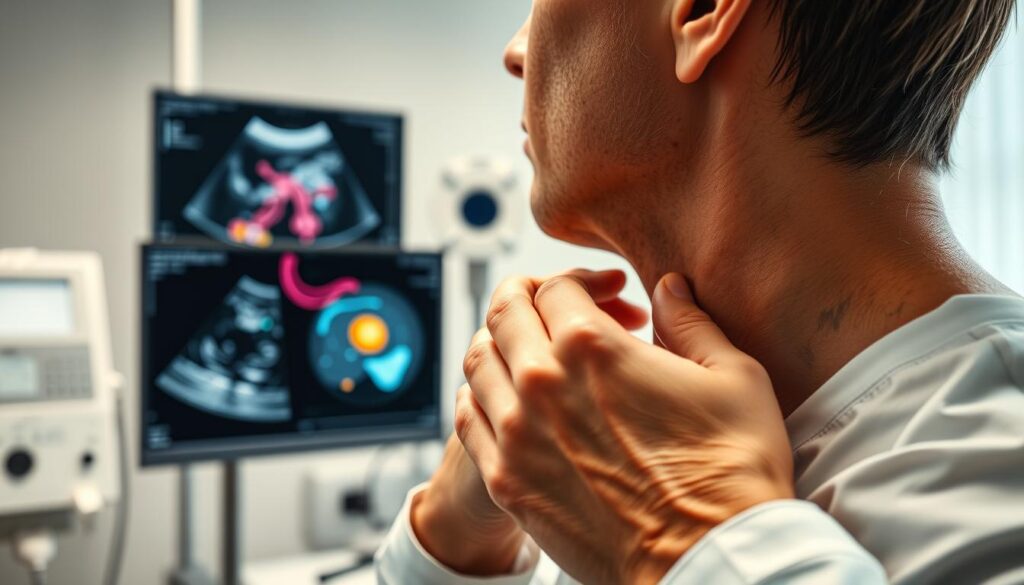Did you know that your body has approximately 600 lymph nodes, with some as small as 1 mm and others as large as 2 cm in diameter1? These tiny structures are part of the lymphatic system, a network that plays a vital role in your immune function and overall health. The lymphatic system acts like a filtration system, removing harmful substances and pathogens from your body to keep you healthy.
Imagine your lymphatic system as a silent guardian, working tirelessly behind the scenes. It circulates lymph, a clear fluid, through your body, filtering out impurities and supporting your immune response1. This system is so crucial that without it, your body would quickly become overwhelmed by toxins and infections. The lymph nodes, located in key areas like your neck, armpits, and groin, act as filters, trapping harmful substances and preventing them from spreading1.
Understanding how your lymphatic system works is essential for maintaining your health. It operates similarly to your blood circulatory system, returning interstitial fluid to your bloodstream and ensuring your body functions smoothly1. A healthy lymphatic system is key to preventing illnesses and supporting your overall well-being. By learning more about your lymph nodes and the lymphatic system, you can take proactive steps to protect your health and reduce the risk of serious conditions.
Key Takeaways
- Your lymphatic system is a network of vessels, nodes, and ducts that supports immune function and fluid balance.
- Lymph nodes act as filters, trapping harmful substances and preventing infections from spreading.
- The lymphatic system works similarly to the blood circulatory system, returning interstitial fluid to the bloodstream.
- Efficiency in the lymphatic system is crucial for overall body health.
- Lymph nodes are located in key areas such as the neck, armpits, and groin.
Understanding Your Lymphatic System
Your lymphatic system is a vital network that plays a crucial role in maintaining your overall health. It’s designed to protect your body from harmful invaders and ensure proper fluid balance. This system is made up of lymph capillaries, vessels, nodes, and ducts that work together to keep you healthy2.
Anatomy and Key Components
The lymphatic system includes lymph capillaries, which are tiny vessels that collect fluid from tissues. This fluid, called lymph, is rich in lymphocytes, which are specialized cells that fight infections3. The system also includes lymph nodes, which act as filters, trapping harmful substances like bacteria and viruses.
Functions and Importance
One of the key functions of the lymphatic system is to maintain fluid balance by returning excess fluid to the bloodstream2. It also plays a role in absorbing fatty acids from the small intestine, which are then transported to the bloodstream3. Additionally, the lymphatic system helps protect the body from infections by coordinating immune responses.
In summary, the lymphatic system is essential for maintaining fluid balance, absorbing nutrients, and protecting the body from infections. Understanding its anatomy and functions can help you appreciate its importance in overall health2.
Lymph Nodes Demystified: What Every Health-Conscious Person Should Know
Interpreting Lymph Node Changes
Have you ever noticed swollen lymph nodes and wondered what they mean? These small, bean-shaped structures are part of your body’s defense system. When they swell, it’s often a sign that your immune system is hard at work.
Swollen lymph nodes can occur due to infections like the flu or strep throat. They may also swell in response to certain medications or autoimmune conditions. Understanding these changes can help you identify when to seek medical advice.
In some cases, like COVID-19, swollen lymph nodes can be a symptom in 1-3% of patients4. This swelling is usually mild and temporary, but it can persist in some individuals4. If you notice swollen lymph nodes along with other symptoms like fever or fatigue, it’s important to consult a healthcare professional.
While swollen lymph nodes are often a normal immune response, persistent swelling could indicate a more serious condition. Monitoring your symptoms and seeking timely medical advice can make a significant difference in your health outcomes.
How Lymph Nodes Work Within Your Immune System
Your immune system relies heavily on lymph nodes to protect your body from infections and diseases. These small, bean-shaped structures are located throughout your body, particularly in areas like your neck, armpits, and groin. They act as filters, trapping harmful substances like bacteria and viruses to prevent them from spreading5.
Lymphocytes and Immune Protection
Lymph nodes are home to lymphocytes, a type of white blood cell that plays a crucial role in your immune response. These cells identify pathogens and trigger an immune reaction to neutralize threats. When your body detects an infection, lymphocytes spring into action, multiplying rapidly to combat the invaders5.
Filtering Out Infections
Lymph nodes act as filters, trapping infectious agents in the lymph fluid. This process prevents pathogens from entering your bloodstream and causing widespread infection. The nodes also produce antibodies, which are proteins designed to target specific pathogens, making them a key part of your body’s defense mechanism5.
In summary, lymph nodes are essential for filtering harmful substances from your lymph fluid and coordinating your immune response. By understanding how they work, you can better appreciate the importance of maintaining a healthy immune system.
Causes and Conditions Leading to Swollen Lymph Nodes
Swollen lymph nodes can result from various causes, ranging from infections to chronic conditions. Understanding these causes is crucial for assessing when swelling might be a sign of something more serious.
Viral and Bacterial Infections
Viral infections are a common cause of swollen lymph nodes. For instance, infectious mononucleosis, often called “mono,” frequently leads to swollen nodes, especially in the neck6. This infection is highly contagious and prevalent among teenagers and young adults. Similarly, bacterial infections like strep throat can cause lymph nodes to swell as the body fights off the infection.

In some cases, like COVID-19, swollen lymph nodes can occur in 1-3% of patients6. This swelling is usually mild and temporary but may persist in some individuals. If you notice swollen lymph nodes alongside other symptoms like fever or fatigue, it’s important to consult a healthcare professional.
Other Underlying Conditions
Beyond infections, certain chronic conditions can cause lymph nodes to swell. Autoimmune diseases, where the body’s immune system attacks its own tissues, can lead to persistent swelling. Additionally, cancers like lymphoma can cause lymph nodes to enlarge as the disease progresses. In such cases, it’s critical to seek medical evaluation to determine the underlying cause and appropriate treatment.
Lymph Nodes and Cancer: Recognizing the Signs
Cancer can manifest in various forms, and one of the most significant roles lymph nodes play is in diagnosing and staging cancer. This section explores how lymph nodes are involved in cancer, particularly in lymphoma, and why early detection is crucial.
Understanding Lymphoma and Its Impact
Lymphoma is a type of cancer that originates in the lymphatic system. It is broadly classified into two main types: Hodgkin lymphoma and non-Hodgkin lymphoma. Hodgkin lymphoma is distinguished by the presence of Reed-Sternberg cells and is one of the most curable forms of cancer7.
Non-Hodgkin lymphoma, on the other hand, encompasses a wide variety of cancers that arise from lymphocytes. B-cell lymphomas are the most common type, accounting for the majority of non-Hodgkin lymphoma cases7.
Lymph nodes can also become enlarged due to metastasis from other cancers. When cancer spreads, it can travel through the lymphatic system, making lymph nodes a key indicator in cancer staging. Early detection of these changes is vital for effective treatment8.
Recognizing the signs of lymphoma is essential. Common symptoms include swollen lymph nodes, fever, and unexplained weight loss. If you notice persistent swelling or other concerning symptoms, consulting a healthcare professional is crucial for timely diagnosis and treatment7.
Diagnostic Approaches and When to Seek Medical Advice
Accurate diagnosis of lymph node changes involves various imaging techniques and biopsies, with early evaluation of symptoms being crucial for effective treatment. Understanding these diagnostic tools helps you take proactive steps toward your health.
Medical Imaging and Biopsy Techniques
Doctors use imaging tools like CT scans to assess lymph nodes throughout your body. Biopsies, which involve removing a node for lab testing, are essential for identifying cancer cells9. Fine needle aspiration and core needle biopsies are common methods, each with different recovery times and diagnostic insights10.
Evaluating Symptoms and Knowing When to Act
If you notice swollen nodes in your neck or underarms, it’s important to monitor their persistence. Symptoms like fever or weight loss, alongside swollen nodes, warrant a visit to a healthcare professional. Early detection significantly impacts treatment outcomes, especially in cases like lymphoma9.

Remember, persistent symptoms or unusual node characteristics should prompt medical advice. Timely action ensures better health management and peace of mind.
Supporting Your Lymphatic and Immune System Naturally
Taking care of your lymphatic and immune systems is a proactive approach to enhancing your overall health. By making informed lifestyle and dietary choices, you can create an environment where your body thrives. This section will explore simple yet effective ways to support these vital systems.
Lifestyle and Dietary Choices
Enhancing your lymphatic health begins with your daily habits. Staying hydrated is crucial as water helps maintain the consistency of lymph fluid, preventing it from becoming thick and sluggish11. Aim for at least 8 glasses of water each day to support optimal circulation.
Your diet plays a significant role in lymphatic health. Focus on consuming fruits, vegetables, lean proteins, and whole grains to provide essential nutrients. Avoid processed foods and excess sugar, as they can lead to inflammation and hinder detoxification efforts11.
Regular physical activity is another key component. Exercise stimulates lymph flow, helping to remove toxins from your body. Activities like yoga or brisk walking can be particularly beneficial. Additionally, managing stress through meditation or deep breathing can further support your immune system11.
| Strategy | Benefit | Result |
|---|---|---|
| Hydration | Maintains lymph fluid consistency | Optimal lymphatic circulation |
| Balanced Diet | Provides essential nutrients | Supports detoxification |
| Regular Exercise | Stimulates lymph flow | Enhances toxin removal |
| Stress Management | Reduces inflammation | Boosts immune function |
By implementing these strategies, you can take charge of your health, fostering a robust lymphatic and immune system. Remember, small adjustments can lead to significant, positive results for your overall well-being.
Conclusion
In conclusion, your lymph nodes play a vital role in maintaining your immune health and overall well-being. Located in key areas such as your neck, these small, bean-shaped structures act as filters, trapping harmful substances like bacteria and viruses to prevent infections from spreading12. Monitoring your lymph nodes, especially those in the neck and other accessible areas, can provide early signs of potential health issues.
Early detection of changes in your lymph nodes is crucial for better health outcomes. For instance, swollen lymph nodes in the neck or underarms could indicate infections like strep throat or more serious conditions such as lymphoma12. If you notice persistent swelling, especially when accompanied by symptoms like fever or fatigue, it’s important to seek medical advice promptly.
By staying informed and proactive about your lymph node health, you can take steps to support your immune system and overall well-being. Remember, early detection and proper care can make a significant difference in managing your health effectively. Use the insights from this guide to discuss any concerns with your healthcare provider and take charge of your well-being.
FAQ
What causes swollen lymph nodes?
How do lymph nodes support the immune system?
Can swollen lymph nodes be a sign of cancer?
What is the difference between Hodgkin lymphoma and non-Hodgkin lymphoma?
How are swollen lymph nodes diagnosed?
What lifestyle changes can support lymphatic health?
Source Links
- Health assessment demystified 978-0-07-177279-2, 0-07-177279-0, 978-0-07-177201-3, 0-07-177201-4 – DOKUMEN.PUB – https://dokumen.pub/health-assessment-demystified-978-0-07-177279-2-0-07-177279-0-978-0-07-177201-3-0-07-177201-4.html
- Lymphatic system: Definition, anatomy, function, and diseases – https://www.medicalnewstoday.com/articles/303087
- The Lymphatic System: Functions, Purpose, Problems & More – Tactile Medical – https://tactilemedical.com/resource-hub/lymphedema/what-is-the-lymphatic-system/
- Understanding Covid-Related Swollen Lymph Nodes – https://cabinethealth.com/blogs/journal/understanding-covid-related-swollen-lymph-nodes?srsltid=AfmBOoqfNatvj5gt01–YK8ZbNp3AOosWtOBXSsZIeiIU_qx2Z4f_nnC
- The Immune System – https://www.hopkinsmedicine.org/health/conditions-and-diseases/the-immune-system
- Lymphedema: Symptoms, Causes & Treatment – https://my.clevelandclinic.org/health/diseases/8353-lymphedema
- Lymphoma – https://www.hematology.org/education/patients/blood-cancers/lymphoma
- Signs and Symptoms of Acute Lymphocytic Leukemia (ALL) – https://www.cancer.org/cancer/types/acute-lymphocytic-leukemia/detection-diagnosis-staging/signs-symptoms.html
- Lymphoma – Diagnosis and treatment – https://www.mayoclinic.org/diseases-conditions/lymphoma/diagnosis-treatment/drc-20352642
- What Are Lymph Node Biopsies? – https://www.webmd.com/cancer/what-are-lymph-node-biopsies
- The Ultimate Guide to Lymphatic Drainage Detoxification – https://drcatherine.com/blogs/womens-wellness/lymphatic-drainage-detoxification-ultimate-guide
- Understanding Covid-Related Swollen Lymph Nodes – https://cabinethealth.com/blogs/journal/understanding-covid-related-swollen-lymph-nodes?srsltid=AfmBOor0apFntgd7pUXwg_C_2xnjttVqh3LXjcTU2Cy4QtNqaJdNtY8R




